World etiquette

The behavior of people is determined not only by their present thoughts and other passing moments, traditions play an important role. What in one culture is considered to be the height of nobility and grace, representatives of another may consider it rude or not at all understand the meaning of a certain action or statement.
Of course, it is impossible for every person to comprehend the traditional way of life and etiquette of all peoples of the world deeper than professional ethnographers and other specialists. But you need to know the most basic points about the culture of behavior in the most significant states.

What is folk etiquette?
Folk etiquette is something that has evolved for centuries and even millennia. Its formation was influenced not so much by political processes and government orders as by everyday life and living conditions of people.
A simple example: if in Russia, and even in Europe, the negotiations that have been successfully completed are reported that they "took place in a warm atmosphere", then in India, in this case, they speak of "cool". And this is just the topmost layer; the origins of many of the customs are difficult to understand even for professionals and most of the locals. It only remains to take note without trying to "remake" other people for themselves.

Features of behavior in different cultures
A wide range of sources will help you to find out the necessary information: there are many books, articles about various countries. Using such information, you will easily make a positive impression on the inhabitants of a foreign country and will better understand their logic and motivation.
For all resolutely cultures, lively interest, participation and benevolence, correctness (that is, the absence of harsh and unconditional criticism) is perceived positively.

Arab countries
The main feature of Arabic etiquette is the strict observance of the precepts of the Koran. During the so-called month of Ramadan, the faithful are forbidden to eat anything during daylight hours. And those who are going to negotiate and conclude deals with residents of Arab countries should take into account that the first month of the Islamic calendar is not intended for receptions and official events.
But even on the most ordinary days, the same negotiations or other joint actions will be interrupted five times a day for prayer. Muslims follow the Friday break very strictly, and there is no need to plan any activities for this day.
Refuse to drink alcohol and pork, let the interlocutor never see it and hear from you even a hint of such behavior.
It is not advisable to discuss religious or political issues, unless this is precisely the purpose of your trip. Politeness in the conduct of business in an Arab country implies its own punctuality, a willingness to accept the owner's delay.


Japan
For the Japanese, the tea ceremony is of tremendous importance. This ritual, if not of a religious nature, is actually familiar to all the inhabitants of the islands who know their culture at least a little. There are even quite a few schools where they teach the mastery of this art for quite substantial money. But of course, Japanese etiquette has many other components as well. In particular:
- soup will not be the first, but the last dish;
- the courtyard is perceived as an extension of the house, and no one sees anything shameful in receiving guests there;
- in communication with both themselves and with foreigners, the Japanese seek to find a compromise, and not provoke a conflict;
- if you demonstrate your hard work and willingness to successfully solve problems, this will only be a plus;
- those who are late for a meeting or negotiation are not taken seriously at all;
- it is better to refuse a handshake.
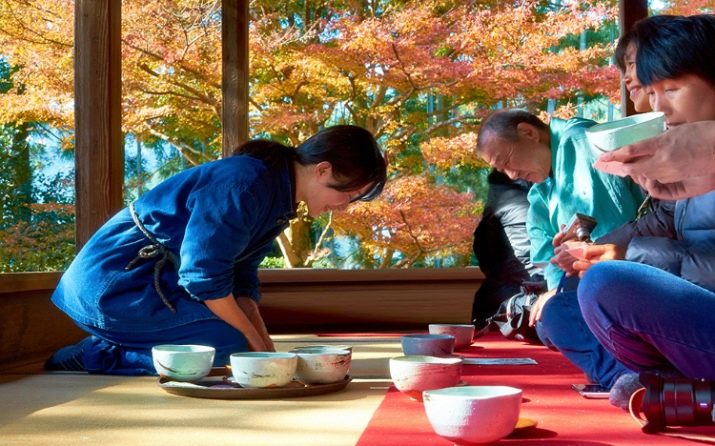
United Kingdom
English etiquette cannot be ignored, if only because it was he who for centuries was one of the most developed. Even today, the extraordinary respect for old traditions has made it possible to preserve many customs that have long gone out of use in other countries. The greeting is simple enough, a handshake you know well.
Important: in England it is customary to shake hands with both men and women - and this tradition has nothing to do with those modern trends that make others indignant at everything European in a row. But kissing hands and publicly expressing compliments is not only frowned upon, but also strongly condemned.


The present British standard of table demeanor is perhaps the strictest in Europe. It is strictly forbidden to put your hands on the table itself, only on your knees.
The device, taken in one hand, cannot be transferred to the other. Vegetables and meat are always served together, so you need to take some meat and use a knife to put vegetables on top, which should remain on the convex part of the teeth. Whoever pierces the components separately from each other is immediately perceived from the negative side.
Yes, the British never talk to each other at the table - if someone speaks, everyone listens to him at once. And when you speak yourself, make sure that anyone present can perceive the speech. Royal accuracy is valued by the British as well as respect for their country as a whole. Anyone who is late even for a minute is perceived as an uncultured person. It is unlikely that anyone would want to deal with such people, be it personal relationships, commercial deals, or cultural projects.

The visit is subject to several conventions:
- mail invitation first;
- then the answer to it, also on the postcard;
- you need to stay at a party no more than ½ hour, politely leave and return home;
- and immediately after that, send an e-mail with thanks for the welcome.
Only the most ill-mannered Englishmen talk with their hands in their pockets. You can gesture, but not too actively, trying to keep your palm towards you. Unless absolutely necessary, do not contact strangers personally before introducing each other.

China
A characteristic feature of China is traditionally calm and measured. The Chinese standard of living is natural in spirit, unhurried; as in Japan, the handling of tea is highly developed. It is brewed according to special recipes and is always drunk at a small table, and a conversation on secular topics is also an indispensable "seasoning". It is unacceptable to sit with a gloomy look or touch on any bad, negative topics.
At the tea ceremony, all status boundaries are abolished, position in society as a whole and in the rest of the hierarchy no longer matters.


France
France is considered a benchmark country in many ways, especially in fashion, clothing and perfumery. In general, etiquette is also very developed there, the French value talkative and tactful interlocutors; no one considers it shameful to give flowers to women, even when there is not even a hint of holidays.
The overwhelming majority of French citizens are not very fond of learning foreign languages, and even those who speak English or German have a bad attitude towards their use in business speech. Therefore, those who master French will have a clear advantage over other foreigners. Do not be lazy to express your praise for this or that dish, since it is gastronomy that is perceived as the pinnacle of France's national achievements.
Leaving food on the plate and adding salt to taste would be gross errors against etiquette; put as much food as you eat exactly, and you will have to put up with insufficient salinity.
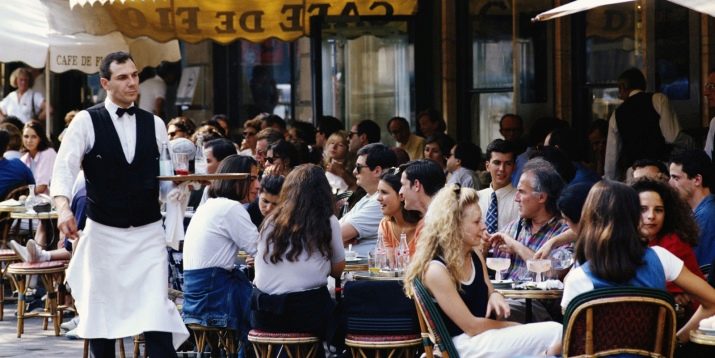
Germany
When you are in any German city, you need to indicate the status of the interlocutor during a conversation. They may forgive their compatriots for the omission in this case, but foreigners need to use every opportunity to reinforce their authority. When you do not know exactly who you are talking to, it is advisable to contact Herr Doctor. Politeness is also manifested in the fact that the visitor of the restaurant greets all those present, regardless of the degree of acquaintance with them, with the word "Mahlzeit".

German politeness invariably implies punctuality; addressing each other to you, emphasize close friendship, Russian approaches must be boldly discarded. A German handshake can mean:
- meeting;
- parting;
- agreement or rejection of the opponent's position.
Therefore, you need to carefully delve into the context of communication and evaluate what this gesture means in a particular case. On the question of affairs and condition, you need to give a detailed and as clear answer, and not be limited to a stingy statement of a good or bad life. Remember: Germans do not hide what they think of their interlocutor, they also express negative assessments if they consider them reasonable.
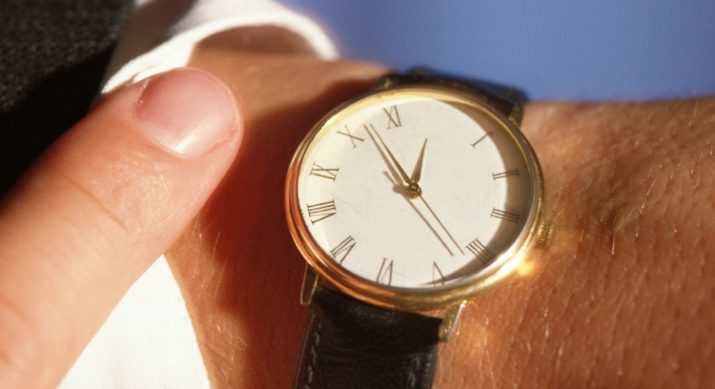
Spain
The hot sun of the Iberian Peninsula defined the characteristic feature of its inhabitants - they invented the so-called siesta. It is undesirable to disturb someone with personal requests and even non-urgent matters from 1 pm to 5 pm. When a Spaniard sincerely invites you to breakfast, he must do so three times. The first two times are just a polite show on duty. Punctual people in Spain will have a harder time than in other countries - they will have to accustom themselves to be 15 minutes late.
If you happen to travel by train from Madrid to Barcelona, Murcia or Seville, invite fellow travelers to share your meal. They will answer in the negative, and you should do the same.


Italy
Just like Spain is one of the leaders in football, Italy is far ahead of other European states in everything when it comes to pasta.But their inhabitants undoubtedly have in common - this is impulsiveness, a tendency to express passions when defending their opinions. Italians gesture a lot, expressing their feelings with the help of facial expressions, so learn non-verbal language if you have to go to Rome, Naples, Venice.
Politeness in Italian also lies in the fact that any conversation begins with a question about the health of children and adults (of course, if it is appropriate). As in Spain, one shouldn't expect excessive punctuality. But it is important to observe the measure: 15 minutes of delay is quite usual, but a half-hour wait will already cause a lot of reproaches... At least five appetizers are put on the table, the first and second courses, cheese, dessert, and so on.
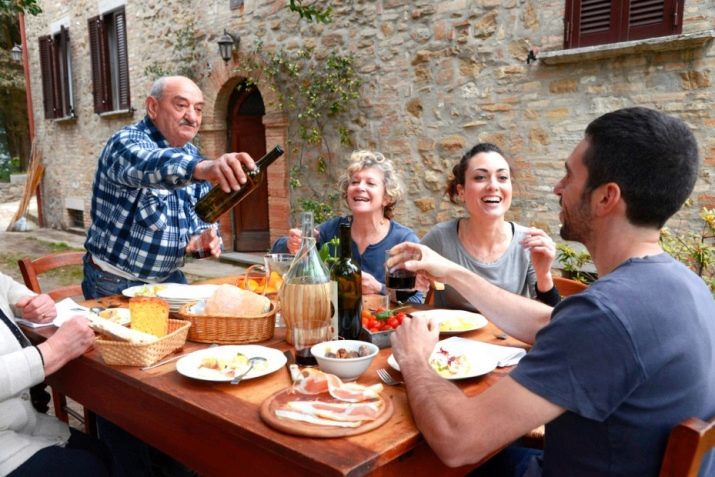
USA
American etiquette, for obvious reasons, is quite close to English, but at the same time it is simpler and more utilitarian. Train yourself to make a big smile when you greet other people or just address them. Shaking hands with those with whom you are not in an official relationship is not recommended. In America, because of the tendency towards gender equality, it is considered impolite to give up seats to women.
An etiquette American will not stop by his friends who haven’t invited him; but if he goes to a celebration, no matter whether it is official or not, he will make every effort not to be late.
Always speak directly and clearly, hints are not easily understood by the people of the United States. The principles of rational nutrition for the population of this country are much more important than knowledge of the manner of handling a knife and fork.


Turkey
Turkish etiquette is also quite specific. So, women are required to always walk in long clothes that completely cover the limbs; and even to men no matter the weather, you must not wear shorts in public places. Local residents consider inviting a guest to a bathhouse in the order of things, it is even honorable according to Turkish performances.
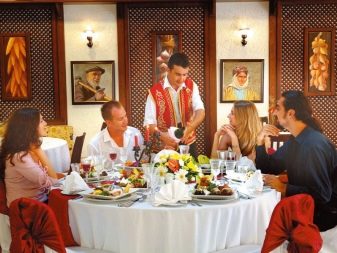

India
Everyone knows at least one rule of Indian etiquette - when inviting Hindus to your place, you should categorically refrain from beef dishes. When meeting, it is advisable to avoid shaking hands, at least not to impose them on the other side. Those travelers who are fully clothed inspire more confidence and respect in Indians than frivolous people. When preparing for a purely business or formal event, you need to dress in a conservative style, this will be immediately appreciated.
The people of Hindustan do not see anything shameful when, even in a purely working relationship, they are interested in very personal details; be prepared that they will try to find out the maximum of such information from you.
You should not be offended, but you can use such a tradition to get to know the other side more deeply yourself.


Korea
Korean traditions in the field of etiquette, like the Chinese, are primarily due to the reproduction of the family hierarchy at the level of the whole society. The most senior of those present are treated with the utmost respect. Women who smoke and drink alcohol are perceived sharply negatively in Korean society.
An important national tradition is the minimal use of furniture; eating, sitting on the floor is quite common. Entering a restaurant and discovering a not too sophisticated atmosphere, do not rush to look for another establishment; in Korea, it is generally not customary to pay attention to external design, the main emphasis is on the quality of cooking as such.

Traveler Code of Conduct: Memo
In principle, it is not possible to describe in one article or even in a large book the customs of all the peoples of the world. But you can focus on certain points that may be useful to you.
So, Greek traditions imply the obligatory presentation of gifts to housewives - gifts from guests most often turn out to be cakes, flowers, juices and cheeses.
The European approach to ecology is very attractive and modern in spirit. However, in Sweden the requirements even for foreigners are stricter than the continental average.It is enough to leave trash in nature after a picnic to get a very substantial fine. It is also undesirable to enter the territory where other people live without an invitation.... But if you manage to make friends with the natives, you will immediately see that they are quite organized, by no means prim and very friendly in character.


Norwegians attach importance to ecology no less than their eastern neighbors. They look very suspiciously at those who harm trees and vegetation in general. It should be borne in mind that a rare Norwegian calmly refers to noise, to the violation of silence and order. It is hard to imagine that even locals hurrying to the train would push each other and hit someone in the crowd with their luggage.
The Danes focus their efforts on caring for their private homes, which look as elegant as possible, but at the same time are by no means colorful. The lifestyle in this country is characterized by a calm rhythm. Punctuality is not as strict as in the UK, however this only applies to informal meetings. Business representatives and government officials treat those who are late for meetings and negotiations very badly. And for those who are not sufficiently prepared, unprofessional.


Regardless of which country you find yourself in, requires you to act respectfully towards the local population; remember, you represent not only yourself, but also a huge number of other people, the opinion of which is formed by your behavior, including... Whatever strange and unusual customs might be found on the way, do not rush to be surprised, all the more to express indignation or even violent joy if something gives pleasure. Indeed, in the modern Russian way of life, there are guaranteed moments that will baffle any foreigner.
Try not to laugh in African countries, this can be understood as amazement or a feeling of something incomprehensible.

When an Englishman raises his eyebrows, he is expressing skepticism about anything. When a resident of Germany does the same, it demonstrates admiration.
In the eastern (Arab) culture, it is not customary to transfer money, things and especially gifts with the left hand, this will greatly offend another person.


You will learn all about the peculiarities of behavior in different countries of the world from the following video.








